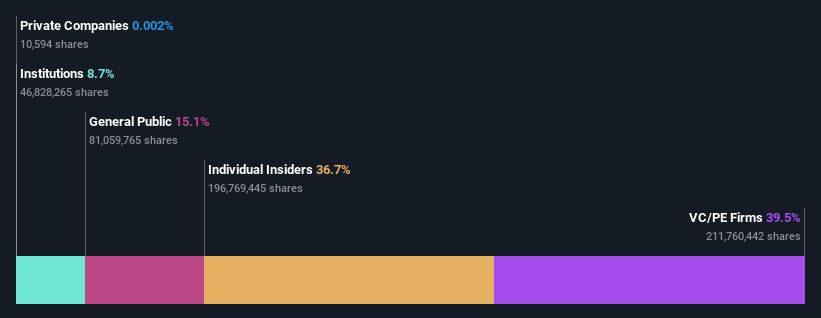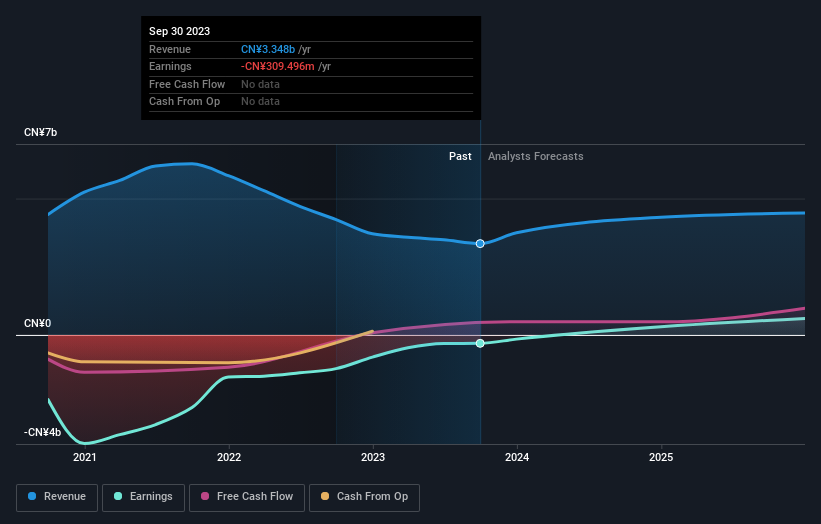Insiders own 37% of Yatsen Holding Limited (NYSE:YSG) shares but private equity firms control 39% of the company
Key Insights
Significant control over Yatsen Holding by private equity firms implies that the general public has more power to influence management and governance-related decisions
52% of the business is held by the top 2 shareholders
If you want to know who really controls Yatsen Holding Limited (NYSE:YSG), then you'll have to look at the makeup of its share registry. And the group that holds the biggest piece of the pie are private equity firms with 39% ownership. Put another way, the group faces the maximum upside potential (or downside risk).
And individual insiders on the other hand have a 37% ownership in the company. Insiders often own a large chunk of younger, smaller, companies while huge companies tend to have institutions as shareholders.
Let's take a closer look to see what the different types of shareholders can tell us about Yatsen Holding.
View our latest analysis for Yatsen Holding
What Does The Institutional Ownership Tell Us About Yatsen Holding?
Many institutions measure their performance against an index that approximates the local market. So they usually pay more attention to companies that are included in major indices.
As you can see, institutional investors have a fair amount of stake in Yatsen Holding. This suggests some credibility amongst professional investors. But we can't rely on that fact alone since institutions make bad investments sometimes, just like everyone does. When multiple institutions own a stock, there's always a risk that they are in a 'crowded trade'. When such a trade goes wrong, multiple parties may compete to sell stock fast. This risk is higher in a company without a history of growth. You can see Yatsen Holding's historic earnings and revenue below, but keep in mind there's always more to the story.
Yatsen Holding is not owned by hedge funds. With a 31% stake, CEO Jinfeng Huang is the largest shareholder. With 20% and 10% of the shares outstanding respectively, Hillhouse Investment Management, Ltd. and ZhenFund Inc. are the second and third largest shareholders.
To make our study more interesting, we found that the top 2 shareholders have a majority ownership in the company, meaning that they are powerful enough to influence the decisions of the company.
While studying institutional ownership for a company can add value to your research, it is also a good practice to research analyst recommendations to get a deeper understand of a stock's expected performance. Quite a few analysts cover the stock, so you could look into forecast growth quite easily.
Insider Ownership Of Yatsen Holding
The definition of an insider can differ slightly between different countries, but members of the board of directors always count. The company management answer to the board and the latter should represent the interests of shareholders. Notably, sometimes top-level managers are on the board themselves.
I generally consider insider ownership to be a good thing. However, on some occasions it makes it more difficult for other shareholders to hold the board accountable for decisions.
It seems insiders own a significant proportion of Yatsen Holding Limited. Insiders have a US$143m stake in this US$391m business. This may suggest that the founders still own a lot of shares. You can click here to see if they have been buying or selling.
General Public Ownership
The general public-- including retail investors -- own 15% stake in the company, and hence can't easily be ignored. While this group can't necessarily call the shots, it can certainly have a real influence on how the company is run.
Private Equity Ownership
With a stake of 39%, private equity firms could influence the Yatsen Holding board. Some investors might be encouraged by this, since private equity are sometimes able to encourage strategies that help the market see the value in the company. Alternatively, those holders might be exiting the investment after taking it public.
Next Steps:
While it is well worth considering the different groups that own a company, there are other factors that are even more important.
I like to dive deeper into how a company has performed in the past. You can find historic revenue and earnings in this detailed graph.
If you are like me, you may want to think about whether this company will grow or shrink. Luckily, you can check this free report showing analyst forecasts for its future.
NB: Figures in this article are calculated using data from the last twelve months, which refer to the 12-month period ending on the last date of the month the financial statement is dated. This may not be consistent with full year annual report figures.
Have feedback on this article? Concerned about the content? Get in touch with us directly. Alternatively, email editorial-team (at) simplywallst.com.
This article by Simply Wall St is general in nature. We provide commentary based on historical data and analyst forecasts only using an unbiased methodology and our articles are not intended to be financial advice. It does not constitute a recommendation to buy or sell any stock, and does not take account of your objectives, or your financial situation. We aim to bring you long-term focused analysis driven by fundamental data. Note that our analysis may not factor in the latest price-sensitive company announcements or qualitative material. Simply Wall St has no position in any stocks mentioned.


